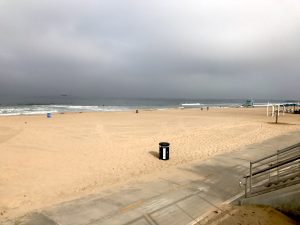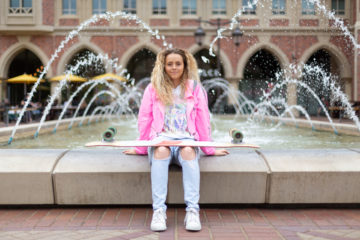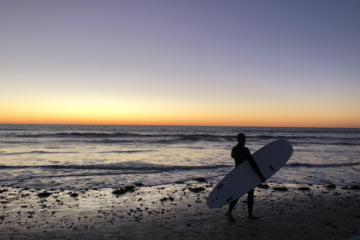The 72-Hour Rule
Mike Sullivan has been an El Porto surfer for 25 years. He knows the streets of Los Angeles slide into the waters of the South Bay every time there is rain. However, this does not stop him from paddling out to surf.
“El Porto has become my surfing home and I will not let a little dirty water stop me from doing something I love,” he says. “The other I saw red tide here while I was surfing. I just kept surfing though.”
In Southern California, polluted runoff is the leading cause of contaminated waters. The pollution in the runoff water can be contributed to the fact that Los Angeles is a major industrial city with a lot of factories, oil, waste and other scraps that are harmful on the environment. Many harmful environmental pollutants have built up during the recent drought, causing severe run off during the first major rains of the season.

El Porto
The Surfrider Foundation has always advised for beach goers to stay out of the water 72 hours after a rainfall. This is because of the polluted runoff that goes into the ocean and causes the water to become contaminated. These 72 hours will give time for the pollution to dilute. Surfers paddling out into the contaminated runoff ocean water can catch viruses and other bacteria diseases. In El Porto there are also large storm drains in that area, which can also lead to an increased risk of infections.
Nick Sadrpour, a Science, Research and Policy Specialist at University of Southern California in the Sea Grant Program, explains how the South Bay area is affected by the runoff.
LA is an urban sprawl metropolis with a lot of impervious surfaces, he says. Everything goes into the storm drains, which then lead to the L.A. River and Ballona Creek.
“Whether it is break dust, which has a lot of copper and zinc in it, or cigarette buds or plastic bags, straws, anything on the street, dog poop, it’s all being funneled into those systems like Ballona Creek,” he says. “And then that water is conveyed straight into the ocean with pretty much no filtering.”
However, many local South Bay surfers have decided to not let the polluted runoff waters get in the way of their love for surfing.
“I generally stay out of the water one full day after the first rain of the season,” says Sullivan. “Some people think I am crazy but I have been OK so far.”
Karl Woodbury, an employee at Nikau Kai Surf and Café in the South Bay area, had a similar take on the 72-hour rule. Karl grew up surfing his whole life on the East Coast of Australia and moved to Southern California two years ago. Karl says he is very used to surfing in the warmer, clearer waters of Australia. Since moving here, he enjoys coming to El Porto in the winter months because the swells are better in that part of the bay.
“I don’t necessarily follow the 72-hour rule,” he says. “That being said, it isn’t awesome all of the time. I have been surfing and gotten hit in the head by band aids and things like that.”
While the majority of the South Bay surfers will run the risk of an infection to do something they love and enjoy, that doesn’t mean runoff isn’t a problem. Sadrpour says we can make a big difference by adjusting a few little things.
This can be as simple as using rain barrels or installing rain gardens, he says.
“Sweeping storm drain screens before a big storm, picking up after your pets, disposing of pharmaceuticals properly, and washing your car over a lawn or at a carwash — these are some very simple everyday things to help,” he says. “Reducing single use plastic is also a big one. Getting involved in your local community is what I would recommend everyone to do.”


